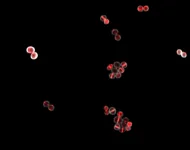(Press-News.org) Francis Crick Institute press release
Under strict embargo: 15:00hrs GMT 23 March 2023
Peer reviewed
Observational study
People
Research from the Francis Crick Institute published today in Current Biology has revealed that diversity in genes coding for immunity may have facilitated adaptation to farming lifestyles in prehistoric periods.
Researchers at the Ancient Genomics Laboratory at the Crick studied available genome-wide DNA from 677 individuals dating to Stone Age Europe, spanning the movement of Neolithic farmers from the Near East into Europe about 8000 years ago, where they mixed with Mesolithic hunter-gatherers already in Europe.
They were interested in whether any particular genes might have coded for adaptations important to early farming groups, and looked for evidence of rapid evolution in these populations.
Since about 20% of the ancestry of descendant late Stone Age people could be traced to the local European hunter-gatherers, the researchers also asked whether any particular genes showed evidence of more hunter-gatherer ancestry.
They found that a large genetic region responsible for immune responses to diseases – the major histocompatibility complex (MHC) – showed both the strongest evidence of rapid evolution, and more Mesolithic hunter-gatherer ancestry than expected, suggesting that genetic variants in the MHC region already present in Europe were passed down preferentially.
It has previously been thought that the transition to farming was associated with increased natural selection on immunity variants, as people started living closer to animals and eating more animal products. This research supports this view, but also shows that diversity in immune genes may be just as important as adaptation to lifestyle.
The research team speculates that either the hunter-gatherers already had genetic adaptations against bacteria, viruses or other microorganisms in Europe, or that having many different forms of the genes was advantageous.
Tom Davy, PhD student at the Francis Crick Institute and lead author, said: “It was really exciting to see for the first time that immunity is important for the transition to farming in a prehistoric population. The later Neolithic people had far more farmer ancestry in general, so we expected to see the same at the MHC region, especially as many diseases have been linked to Neolithic periods. But we saw about 50:50 ancestry from Neolithic farmers and Mesolithic hunter-gatherers here, showing that natural selection favoured genes from the hunter-gatherers already in Europe.
“At the moment we’re not quite sure why this happened, but a proposal is that the European hunter-gatherers had genetic variations which allowed them to fight Europe-specific diseases. Or picking up a variety of genes from both hunter-gatherers and farmers was beneficial because it resulted in lots of diversity at this major group of genes, allowing people to better fight off disease.”
The team also confirmed results from previous studies, showing that genes coding for skin pigmentation showed the greatest representation for Neolithic farmer ancestry, with these variations coming into Europe from the Near East. This may be to maintain vitamin D levels when sources, such as diet and exposure to sunlight, change.
Pontus Skoglund, Group Leader of the Ancient Genomics Laboratory at the Crick, said: “The shift to farming was an important transition all over the world, resulting in changing diets and exposure to infectious disease.
“Previous research has suggested that adaptation in genetic regions relating to immunity, such as the MHC, has been important in recent time periods, and this research now provides similar evidence for adaptation in prehistory. By growing the ancient genomic record, we will be able to better understand the role of immunity in other periods of the human past.”
-ENDS-
For further information, contact: press@crick.ac.uk or +44 (0)20 3796 5252.
Notes to Editors
Reference: Davy, T. et al. (2023). Hunter-gatherer admixture facilitated natural selection in Neolithic European farmers. Current Biology. doi.org/10.1016/j.cub.2023.02.049
The Francis Crick Institute is a biomedical discovery institute dedicated to understanding the fundamental biology underlying health and disease. Its work is helping to understand why disease develops and to translate discoveries into new ways to prevent, diagnose and treat illnesses such as cancer, heart disease, stroke, infections, and neurodegenerative diseases.
An independent organisation, its founding partners are the Medical Research Council (MRC), Cancer Research UK, Wellcome, UCL (University College London), Imperial College London and King’s College London.
The Crick was formed in 2015, and in 2016 it moved into a brand new state-of-the-art building in central London which brings together 1500 scientists and support staff working collaboratively across disciplines, making it the biggest biomedical research facility under a single roof in Europe.
http://crick.ac.uk/
END
Being vaccinated against Covid halves people’s risk of developing long Covid, according to new research from the University of East Anglia.
Long Covid still affects some two million people in the UK, and new research published today reveals the risk factors associated with developing the condition.
Overweight people, women, smokers and those over the age of 40 are also more likely to suffer from long Covid according to the study - which includes more than 860,000 patients and is thought to be the largest of its kind.
The study also finds that co-morbidities such as asthma, COPD, Type 2 Diabetes, coronary heart disease, immunosuppression, anxiety ...
About The Study: This systematic review and meta-analysis of 41 studies including 860,000 patients found that certain demographic characteristics (e.g., age and sex), comorbidities, and severe COVID-19 were associated with an increased risk of post−COVID-19 condition (PCC; also known as long COVID), whereas vaccination had a protective role against developing PCC sequelae. These findings may enable a better understanding of who may develop PCC and provide additional evidence for the benefits of vaccination.
Authors: Vassilios ...
About The Study: This cohort study found that in people with SARS-CoV-2 infection who had at least one risk factor for progression to severe disease, treatment with nirmatrelvir within five days of a positive SARS-CoV-2 test result was associated with reduced risk of post−COVID-19 condition (also known as long COVID) across the risk spectrum in this cohort and regardless of vaccination status and history of prior infection. The totality of the findings suggests that treatment with nirmatrelvir ...
About The Study: This case control study found that for female individuals, the loss of abortion rights was associated with a 10% increase in prevalence of mental distress relative to the mean over the three months after the Supreme Court of the U.S. decision. Restricting legal abortion access may be associated with disproportionate outcomes among individuals of lower socioeconomic status and in medically underserved areas, who may experience greater economic and mental health burdens of having unwanted pregnancies due to increased travel costs of obtaining abortions.
Authors: Muzhe Yang, Ph.D., of Lehigh University in Bethlehem, ...
BOSTON – New research led by investigators at Massachusetts General Hospital (MGH), a founding member of Mass General Brigham (MGB), found that males but not females born to mothers with SARS‐CoV‐2 infection during pregnancy were more likely to receive a neurodevelopmental diagnosis in the first 12 months after delivery. The findings are published in JAMA Network Open.
Previous studies have found associations between other infections during pregnancy and increased risk of neurodevelopmental disorders in children, such as autism spectrum disorder, but it’s unclear if such a link exists with SARS‐CoV‐2 infection during pregnancy. To investigate, ...
MIAMI, FLORIDA (EMBARGOED UNTIL THURSDAY, MARCH 23, 2023, AT 11 A.M. ET) – Treatment outcomes for patients with malignant pleural mesothelioma, a rare cancer commonly known as mesothelioma, are often affected by social determinants of health and overall survival rates could be improved by addressing these health disparities and improving access to specialized care.
That’s the key takeaway from new research published March 23 by investigators at the Sylvester Comprehensive Cancer Center at the University of Miami Miller School of Medicine and collaborators, whose study appears in the journal JAMA Network Open.
“We found that mesothelioma patients who ...
FOR IMMEDIATE RELEASE
Research from Johns Hopkins Kimmel Cancer Center experts revealed a type of RNA, previously considered to be “junk,” that may help doctors distinguish and treat a subgroup of patients with medulloblastoma.
Medulloblastoma is the most common malignant brain tumor in children, accounting for about 20% of all pediatric brain cancers. Four groups of medulloblastomas have been identified, and one is named sonic hedgehog (SHH) because of the spiky, hedgehog-like appearance of fruit flies ...
We still do not understand exactly how antibiotics kill bacteria. However, this understanding is necessary if we want to develop new antibiotics. And that is precisely what is urgently needed, because bacteria are currently showing more and more resistance to existing antibiotics. Therefore, researchers from the University Hospital Bonn (UKB) and the University of Bonn used high-performance microscopes to observe the effect of different antibiotics on the cell division of Staphylococcus aureus. They found that the biosynthesis of peptidoglycan, core component of the bacterial cell wall, is the driving force during the entire process of cell division. In ...
Alliance for Cancer Gene Therapy (ACGT) will award the Edward Netter Leadership Award to Crystal Mackall, MD, of Stanford University, at the ACGT Awards Luncheon on March 30 at Riverpark restaurant at the Alexandria Center for Life Science, located at 450 E. 29th St., New York City.
Named for ACGT co-founder, Edward Netter, the award recognizes a researcher who has made unparalleled and groundbreaking contributions to the field of cell and gene therapy for cancer. Dr. Mackall is a leader in advancing cell and gene therapies for the treatment of solid tumors, with a major focus on children’s cancers.
In addition to being an ACGT Research ...
Issues around the loss of coastal heritage due to climate change and how these can be effectively addressed in policy will be discussed during a major conference taking place at the University of East Anglia (UEA) next week.
The conference will discuss a range of pressing issues including how behavioural science can inform choices about what should be saved and how archaeological landscapes are valued, to the human cost of heritage loss and the role art and exhibitions play in addressing ecological crisis.
Heritage takes many forms, and includes physical artifacts, buildings and ecosystems, but also the rich cultural and social aspects ...



